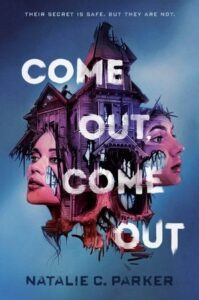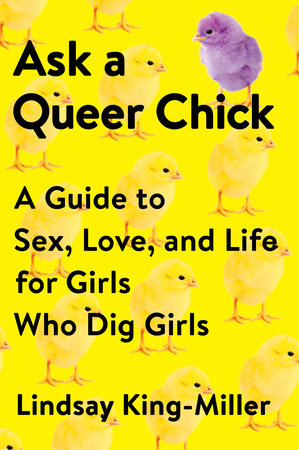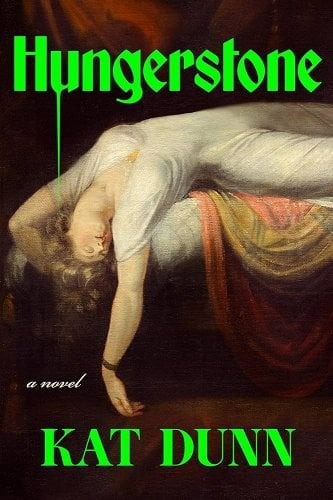Now that we’re out of October, it’s time to move on from spooky books, right? Wrong. Now is the time to read all the books other people read during October and are rec-ing you. I read Come Out Come Out by Natalie C, Parker in only a couple of sessions, and I found it such an engaging yet chilling read. It was genuinely spooky and a great example of YA horror, and I’m delighted that the youths of today get this kind of read on their shelves.
Fern, Mallory, and Jaq live in an idyllic small town, and yet the idyllic small town life is more like a trap to them. Between the strict expectations of their parents, the prevalence of the church and the religious life in the community, and the town sensibilities, it has never been safe for them to come out and be who they really are… except with each other. Vowing to stick together, to survive long enough to leave town, the girls turn to the town urban legend and make a wish for what they need most: to stay safe. But years later, Jaq and Fern are living what they think are vibrant, fulfilling (cisgender, heterosexual) lives, with only vague memories of talking to each other as children, while Mallory is the town cautionary tale. The future seems bright for Fern and Jaq, and they seem to be on the cusp of attaining their dreams. If only they could shake those little nagging feelings that they’re missing something. An incident at a bonfire brings them face to face with each other, and with a spirit that looks shockingly like Mallory. Suddenly those feelings aren’t so little, and Fern and Jaq have to figure out what was taken from them, and how they are going to navigate their lives going forward.
What I enjoyed most about this book was that the church was a source of the horror—and not demons or Satan, but the institution of the church itself and the inflexible communities it can generate. People from actively religious communities will relate to how handily brainwashed Jaq is managed and maneuvered into a “correct” path. The flashbacks from Mallory show that she was less amiable to being managed and more outright rebellious, and her parents’ response was less maneuvering and more abusive. I think it’s important that modern stories acknowledge that modern churches can often have a dark side—and those are the “normal” churches you find in any old town, not just isolated cults in isolated areas. The hold the church has on the town goes back generations, and it’s smothering to the point that young Jaq, Fern, and Mallory can only hope to get away, not coexist peacefully. Parker skillfully blended the real-life horror of being forced into acting like someone you’re not by a narrow-minded community successfully “othering” anyone who does not fit in, the supernatural horror of something lurking in the woods, and being unable to trust your own memories. Parker didn’t linger too long in the “is there or isn’t there” stage of revealing There’s Something Spooky going on. All this combined to a fast-paced, spine-tingling read that I could both relate to and have a good spooky thrill to while reading. It was a great horror experience.
I also thought this was outstanding as YA horror. As an adult reading it, it was became clear pretty quickly what path the girls’ relationships with their families were taking. Being forced to remain the gender you were born with or being railroaded into a relationship with that perfect high school sweetheart are not new narratives, after all. (Although I did not guess the form the supernatural elements would takw: that was a surprise.) But YA isn’t written for jaded adults who have been down those paths before, and I think that if I had been reading this book as a teenager I would have had such a strong reaction to it. I can imagine myself being incredibly angry and indignant at how they were all treated. Because the girls have successfully had their memories stolen and been living false lives for years, Parker is able to bring to the fore the feeling of being stuck between a rock and a hard place. They have to deal with their family’s reasonable expectations (after all, they had, up until the narrative, been perfectly fine with the choices their past selves had been making), doing a speed run on coming to term with their sexualities and genders, and dealing with the more immediate problem of supernatural horrors happening. Teenage me would have been rooting for these girls so hard, but without my current lived experience, it would have been way more nerve-wracking. But, most importantly, I think teenage me would have benefited from the ending. Parker doesn’t end it all sunshine and rainbows, but her mixed-bag of friends and family reactions felt very realistic, and I as an adult appreciated her shout out to the importance of queer organizing and queer community when everything does not go right.
In conclusion, Come Out Come Out is a great YA horror book that should be on more to-read lists, even now that Halloween is over. Treat yourself to a fun read, and then pass it on to any horror-loving teenagers in your life. I don’t recall how this book came into my to-read list, but I’m so glad I got to read and share it with you all.




